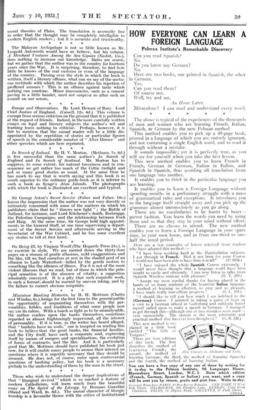Miniature Banking Histories, by R. H. Mottram (Chatto and Windus,
6s.), brings for the first time to the general public the opportunity of acquainting themselves with the per- sonalities, foibles, and traditions of what some people now say are its rulers. With a touch so light as to be unanalysable, the author confers upon the banks themselves, sometimes regarded as almost frighteningly impersonal, all the interest of personality. If it is true, as the writer has heard alleged, that bankers have no souls," one is tempted on reading this book to believe that the great banks, the financial families, and the City itself, have each a corporate soul, expressing itself by means of mergers and specializations, the evolution of forms of contracts, and the like. And it is particularly good that Mr. Mottram should have published his book just now, for it will enable many people to arouse their interest on questions where it is urgently necessary that they should be aroused. He does not, of course, enter upon controversial questions of banking policy, but his book is a necessary prelude to the understanding of them by the man in the street.
• *


































 Previous page
Previous page